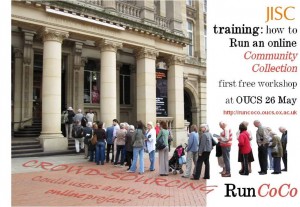 Through a community collection the general public or members of a particular group are invited to contribute to a project by uploading their own content or adding information to existing resources.
Through a community collection the general public or members of a particular group are invited to contribute to a project by uploading their own content or adding information to existing resources.
For sustainable crowdsourcing :
Aim for two-way engagement
Be part of your community
Challenge your assumptions
RunCoCo set out to offer advice, training, and open-source software to those interested in running a community OER collection online using similar approaches as The Great War Archive and Woruldhord. The team aimed to build a support network to exchange knowledge about community collections, provide a point of contact for advice about community collections, and publish outputs which can be used for free by anyone in the sector. At RunCoCo events, projects have come together to exchange success-stories and to discuss the challenges of various community engagement models.
 Alun and Ylva presented on community collections and the power of the crowd at the JISC conference 2010[i], at blended learning[ii] conferences in the UK and at meetings or workshops across Europe. Kate contributed to the debate ‘Should the general public be involved in academic research?’ in JISC Inform[iii]. The types of projects represented at the RunCoCo events and the topics covered included: community collection; using Flickr for crowdsourcing; manuscript transcription; ‘citizen science’; community archives; community archaeology; mass observation; engaging communities like school children, the elderly or the homeless; digital storytelling; digitisation; policies, strategies and impact; good practice for Web design; content management systems; trust and authenticity; copyright and IPR; communications, marketing and publicity; project and / or community sustainability; digital preservation; social media and social networking e.g. Facebook, Flickr and Twitter; and ‘Big Society’. I’ll host a final event in May 2011, “Beyond Collections: Crowdsourcing for public engagement” at OUCS [iv].
Alun and Ylva presented on community collections and the power of the crowd at the JISC conference 2010[i], at blended learning[ii] conferences in the UK and at meetings or workshops across Europe. Kate contributed to the debate ‘Should the general public be involved in academic research?’ in JISC Inform[iii]. The types of projects represented at the RunCoCo events and the topics covered included: community collection; using Flickr for crowdsourcing; manuscript transcription; ‘citizen science’; community archives; community archaeology; mass observation; engaging communities like school children, the elderly or the homeless; digital storytelling; digitisation; policies, strategies and impact; good practice for Web design; content management systems; trust and authenticity; copyright and IPR; communications, marketing and publicity; project and / or community sustainability; digital preservation; social media and social networking e.g. Facebook, Flickr and Twitter; and ‘Big Society’. I’ll host a final event in May 2011, “Beyond Collections: Crowdsourcing for public engagement” at OUCS [iv].
 The workflows and systems developed for The Great War Archive have been re-used in different contexts, and RunCoCo has made these freely available for future projects to use, re-use and build upon. Community Collection software ‘CoCoCo’ developed by Oxford University is available and the system has been adapted for use by others[v]. Based on feedback from users, the system has been developed[vi] and the latest version with support documentation are freely available to download from the RunCoCo website and will be released on GitHub[vii].The RunCoCo website will remain online to continue this dissemination.
The workflows and systems developed for The Great War Archive have been re-used in different contexts, and RunCoCo has made these freely available for future projects to use, re-use and build upon. Community Collection software ‘CoCoCo’ developed by Oxford University is available and the system has been adapted for use by others[v]. Based on feedback from users, the system has been developed[vi] and the latest version with support documentation are freely available to download from the RunCoCo website and will be released on GitHub[vii].The RunCoCo website will remain online to continue this dissemination.
[i] JISC conference 2010, community collections and the power of the crowd http://www.jisc.ac.uk/events/2010/04/jisc10/programme/communitycollections.aspx
[ii] Fifth International Blended Learning Conference “Developing Blended Learning Communities” 16 – 17 June 2010 http://www.herts.ac.uk/about-us/learning-and-teaching/learning-teaching-institute/conferences/blended-learning-conference-2010/home.cfm
[iii] LINDSAY, Kate and KEEN, Andrew: Debate Should the general public be involved in academic research? JISC Inform issue 27 Spring 2010. http://www.jisc.ac.uk/publications/jiscinform/2010/inform27.aspx
[iv] “Beyond Collections: Crowdsourcing for public engagement. A RunCoCo Conference” at the University of Oxford http://www.oucs.ox.ac.uk/ltg/events/beyond2011/
[v] Welsh Voices of the Great War Online website http://www.welshvoices.com/
[vi] Use-cases were worked-up by the team, and the open source Redmine project management Web application (http://www.redmine.org/) was used to create and comment on feature requests and bug reports. [vii] GitHub website https://github.com/